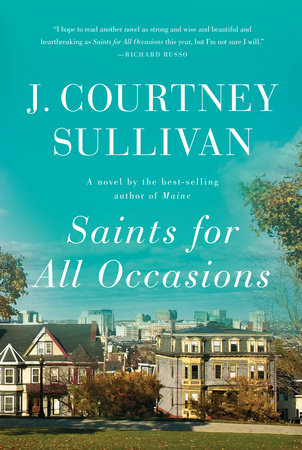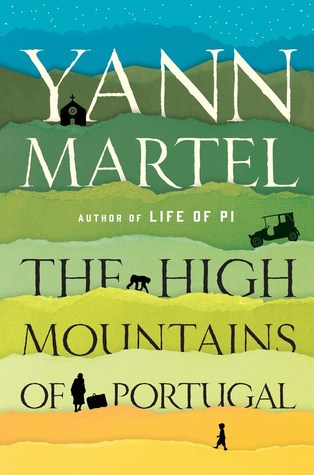
Summer days have been busy so I have been away from the blog a bit. I returned from a short trip to California to visit my folks and plunged headfirst into summer chores and activities here. See the photo at left of our bike ride in the mountains from last week. My reading has taken a bit of a hit as a result as it’s been left on the back burner, but I hope to get it back on track soon.
The two novels I finished lately both had a little about religion and faith to them, though they were not alike. You’ll notice neither are on my “summer reading list” that I put forth in my last post but I started them before “the List” was created. So I will have to jump back to that now. Meanwhile here are my reviews of the two recent books.
(The following summary was culled in part from the publisher’s description)
J. Courtney Sullivan’s 2017 novel “Saints For All Occasions” is about two close, Irish Catholic sisters that immigrate to the U.S. in the late 1950s to start a new life in Boston. The older, responsible one (21-year-old Nora) is shy and serious and engaged to a man she doesn’t know if she wants to marry; the other (17-year-old Theresa) is pretty and outgoing and loves the social scene in Boston. But when Theresa becomes pregnant, Nora comes up with a plan to right the situation that will have life-long repercussions for both of them. Fifty years later, Nora is the mother to four grown children and Theresa is a cloistered nun, living in an abbey in rural Vermont. They haven’t spoken in decades, but a sudden death in the family forces them to confront the choices they made from long ago.

The story alternates chapters of the sisters in the 1950s with those from 2009 among Nora’s grown kids and the two sisters, now in their 70s. The oldest son Patrick, who was a troublemaker growing up, is now a bar owner; then there’s John, a successful political consultant (married with an adopted child); followed by Bridget, quietly planning to have a baby with her girlfriend; and lastly Brian, living at home after a failed baseball career. It’s a well-done story and I got caught up into each of the family members’ modern lives and perspectives and how those differed from their mother Nora’s immigrant one. You get a bit from Theresa, too, about her life at the abbey and why she chose the nunnery — and most importantly why the two sisters’ lives diverged so suddenly and much.
It reminded me a bit of other Irish Catholic family tales, though I haven’t read a lot in this genre. I found it rather frustrating because of the secret kept and things left unsaid among the family members that threaten to undo them (which made me want to yell at each to spill the truth). None of the characters are exactly saints in the story and perhaps that’s the point of the book’s title. I particularly wanted to strangle the mother Nora for her stern ways, grudges, and for making matters worse, but then again she’s not altogether bad, but is caring in her own ways, which makes the novel more complex. It’s a story tinged with sadness and regret that made me think about it for quite awhile afterwards.
This was my first novel that I read by J. Courtney Sullivan and I’d be curious to read her others. I’ve heard that her 2011 novel “Maine” perhaps is the one readers have liked the most, though her two others “Commencement” and “The Engagements” are also talked about. As for “Saints For All Occasions,” I gave it a worthy 3.7 stars on Goodreads.

Next up, I finished the audiobook of Yann Martel’s 2016 novel “The High Mountains of Portugal.” You might recall from his award-winning novel “Life of Pi” that Martel’s stories often unfold like fables, delving in allegory and magical realism and containing animals in them. And this novel is no exception.
The book is broken up into three different sections — each like a novella unto themselves with different main characters and set in different decades, but the stories are slightly inter-connected and all come to pass in the same area of Portugal.
It’s a strange novel that touches on faith and religion, and animals and humans. I almost gave up on the book during Part I as nothing much seemed to be happening to keep my attention. This part is set in Portugal in 1904 where a man, whose family has died, embarks on a journey using one of the earliest motor cars to find an artifact of a mysterious crucifix in the high mountains of Portugal. The premise seems enticing, but early on the story waxes on and on about the inner workings of the car and the man’s frustrations with it — and after while I just wanted to throw the audio against the wall. I was surprised — was this really the work of the great Yann Martel, the same author of “Life of Pi”? I couldn’t believe it. But somehow I kept going and eventually odd things about the crucifix artifact were revealed, including its chimp-like qualities.
Thankfully Part II picks up a bit and tells an odd story set in 1938 about a Portuguese pathologist who receives a visit from his wife who waxes on about Christianity in the works of his favorite author Agatha Christie. Afterwards the pathologist has a strange occurrence while doing an autopsy on a man whose body is filled with unusual items, including a curled up chimpanzee. What the story all means, I couldn’t exactly tell you.
But Part III is by far the best. Set in 1981, it tells the story of a Canadian senator who, grieving his wife’s death, moves to Portugal bringing with him a chimpanzee — freed from an animal research facility — as his companion. This last part is wonderfully told and almost fully made up for the other two lesser parts. All three sections are inter-connected by a character and include a protagonist who is grieving a great loss — moreover they all include chimpanzees. As far as I can tell, each story seems to be about faith or the lack of it, though I’m not sure I understood everything in them — or if Yann Martel was smoking too much dope at the time. But he seems to raise and pursue the Darwinian notion that: “We are risen apes, not fallen Angels,” which he quotes at the end of Part I.
If you liked Martel’s novel “Life of Pi,” as I did, (or the movie) you might give this one a try too. It’s not as great as that one was — but still has a few interesting things about it.
What about you — have you read either of these authors, and if so, what did you think?

Great pictures from your trip. I also do not get much reading done when I travel.
The High Mountains of Portugal sounds very interesting but odd. I tend to like books that revolve around the themes that this one seems to. I still have not read The Life of Pi. I would likely read that first.
Hi Brian: I think you might like Yann Martel’s cryptic allegorical tales that touch on philosophy, faith, religion, science and grief and loss. He’s got a lot of stuff going on in his books, particularly he seems to like animals for representing things. But they are a bit strange! Cheers.
Thank you for your very fine review of Sullivan’s novel. I am fond of Irish stories. I hope to read “Saints for All Occasions” the characters are quite realistic and touching.
Hi RT, Yeah there are quite a few novels that are great Irish immigrant stories. I was slightly reminded of Colm Toibin’s novel Brooklyn, which I enjoyed the movie of, though this one takes a different turn than that. Thanks for stopping by; have a lovely week!
I’m so impressed by your bike ride in the mountains!
I’m going to sound like an old grouch but I’m the one person who didn’t love Maine or Life of Pi so I won’t be anxious to read either of the books you highlighted today.
No problem Kathy, I’m well aware that these authors aren’t always for everyone. Quite a few bloggers mentioned the novel “Maine” though. I don’t know what that one is about but I don’t think I will get to it anytime soon. Cheers!
I also have been running into religion in my recent reading. It does give one much to think about.
Both of the books you reviewed sound good to me. I already had the Yann Martel on my TBR. I have not yet read J Courtney Sullivan but I might give her a try.
I think summer is a time when one cannot put too much pressure on oneself to read. I have been getting through some long non-fiction which slowed me down. But I did read The Shadow Land by Elizabeth Kostova last week and it was so great!
Hi Judy! I feel I’ve been out of touch, but will stop by your site soon. Great to know you really liked the Kostova novel, that’s terrific! In a way, Yann Martel may never live up to Life of Pi again, but that’s okay. The funny thing is, he’s still sticking animals into his stories and this one too has a long speech about Agatha Christie! It’s a bit odd and maybe not be as profound as he hopes. Still Part 3 helped save this book.
I loved Life of Pi, but haven’t decided yet whether to try The High Mountains of Portugal. The reactions to it have been mixed, and there are so many other books to read!
I’m glad to hear your summer is off to a good start. 🙂
Thanks Naomi, yeah I’m not sure you need to read The High Mountains of Portugal. I only thought Part 3 made it worth it. But I’m pleased to hear you loved Life of Pi. You & me both. 🙂 Thx for stopping by.
Life of Pi never appealed to me and, despite my daughter’s reading it for school, I didn’t pick it up. Have a feeling I’ll skip The High Mountains of Portugal, too.
Maine was a favorite summer read several years ago. Your review makes me think Saints For All Occasions would be perfect for a lazy summer weekend by the lake!
Uh-oh JoAnn. We were in sink for awhile 🙂 . I’m okay if you skip Portugal, but no Life of Pi? Glad to hear you liked Maine. I’d like to try one of her other ones. cheers!
I laughed out loud with your comment about Yann Martel smoking too much dope to write this one. I sounds very odd, but I’m glad you think the last part saved the rest of the book from oblivion. I’ve found that certain authors try to replicate the formula of their astoundingly successful books in their subsequent works; most times it doesn’t work and they end up alienating loyal readers by writing about similar things over and over. I hope Martel realizes this before losing the readers that gave him fame.
Yeah I agree Carmen. He’s trying to replicate too much — the same stuff in Life of Pi. But that doesn’t always work. It is a pretty odd story; he might have been smoking dope 🙂 … 50/50 chance? I’m not sure if I need to read him again, or his next book. I think everything of his was summed up in Life of Pi. Cheers.
I have been on the fence about Saints for All Occasions…I loved the author’s book Maine, but really didn’t enjoy The Engagements.
I like the Irish Catholic element (reminding me of my second husband’s family! LOL), and it also has something of Brooklyn about it, but with more of a span in time. I may just have to give this one a whirl.
Martel…probably not.
Thanks for sharing and for visiting my blog.
Hi Laurel, yeah I’m curious about Maine. I thoughts Saints was good but I dont think there’s a need to rush to it. So many books for summer. I think I’ve had my Irish Catholic fill for the moment, LOL. Enjoy your week!
I loved Maine and The Engagements. Based on your review, I think Maine is most similar to Saints for All Occasions and that you’d probably like it. It’s also a family saga that spans several years and deals with family secrets.
Hi Rachel, I hadn’t realized you had read most of her books! It seems Sullivan is good at these family sagas. I had seen the Saints one reviewed on The Washington Post and the critic was high on it — so I gave it a whirl. I enjoyed it. Thx for stopping by.
I love riding my bike and that looks like some awesome scenery to look at while riding!
I’ll have to check the books out since they’re new to me.
Hi Vicki, thanks. We enjoy biking here. The scenery is amazing in the mountains about 1 to 2 hours away. Thx for stopping by!
I LOVED The Engagements. I read it when it was first released and still think about it. I have yet to get to her latest, but friends who have read it loved it. I do think you should give her other novels a try. She is a spectacular author.
Oh thanks Michelle, Great to know! She does seem quite excellent. I’m sure I will try her other books. Glad you liked The Engagements!